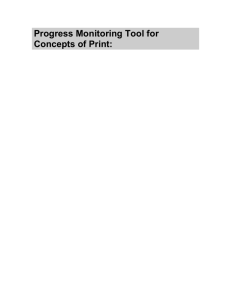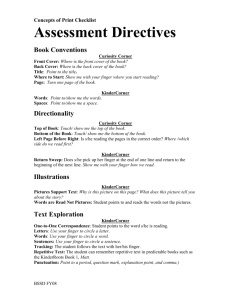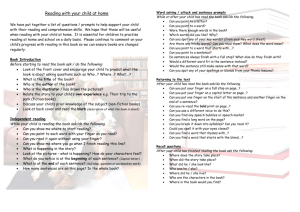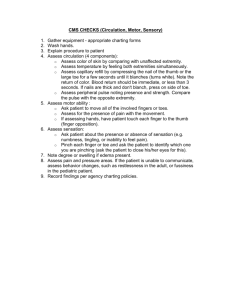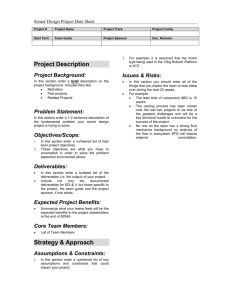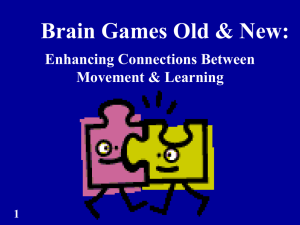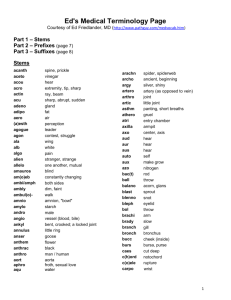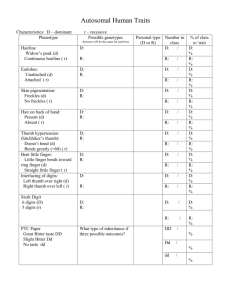Muscle testing with another person
advertisement
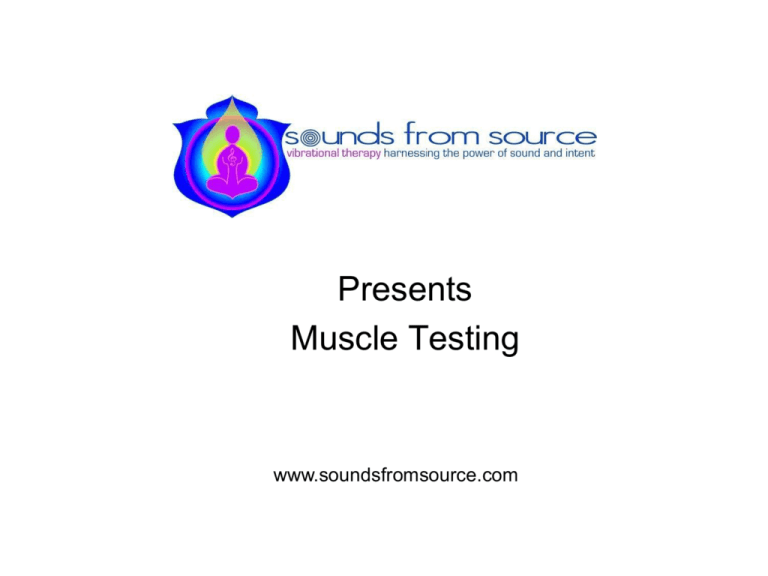
Presents Muscle Testing www.soundsfromsource.com Muscle Testing by Sheila Kennedy-Robinson and Susan Ormsby • • • • • • • Why do we use Muscle Testing Muscle testing techniques are applied to identify energy blockage within the body. Always the answer is inside you. The subconscious mind ‘the genius or computer within’ knows everything about you, and if asked the correct questions will supply the answers. Muscle testing with another person Muscle testing is totally painless in a Kinesiology session. Basically, energy should run from the top of the head down towards the feet, and so if we use some basic kinesiology or muscle testing, we can ascertain true and false answers. If we ask someone to extend their left arm, in this example out from the shoulder, and we place our left hand on their right shoulder, and our right hand lightly on their left wrist [thus creating a “circuit” or a circle between us, and we ask this person to hold their extended left arm strong and to say their name, while we apply a pressure a light to the left wrist, their arm will stay strong if they are giving their true name or telling the truth. If they use a name which is not theirs [a lie in this instance] the arm will not stay strong and will want to “give way”. This process is achieved by using the Deltoid muscle in the upper arm and connecting through to the subconscious mind or the “genius” as I term it. If the question asked has a negative response the body will respond by removing 60% to 80% of the available energy and the arm will become weak. [I often explain to my clients that the subconscious says “Oh, I did not” and withdraws the energy, creating a momentary weakness in the arm, eg the old fashioned lie detector test] Practising Muscle Testing • • • • • • Another good way of testing this is the following process Plants, animals, and humans all have a measurable electrical frequency of 77.678 mhz [a megahertz is a million cycles per second] Explanation of testing for 77.678mhz :If you ask some one to hold onto a nice green leaf still connected to a plant, the kinesiological measurement electrically will be 77.678mhz, So how do you do this, using the muscle testing procedure outlined [see diagram at right] ask the person to hold onto a leaf with their right hand, and hold their left arm out straight and firm [ swop arms if you are left handed ] Now place your right hand on their left wrist and ask for the maximum electrical measurement of the leaf that the person is holding. So light pressure on their wrist and make the statement “the maximum electrical frequency of this leaf is 77.678mhz. Then lightly pressing on the wrist count by 10 to 70, eg 10, 20, 30, 40, 50, 60 70, the arm will stay firm, 80 and the arm will become weak, Go back to 70, eg hold your arm firm please, 70, 71,72,73,74,75,76, 77, all will be strong, 78 and the arm will become weak or give way. So we can prove that the maximum frequency of the green leaf is 77mhz or if you want to test in more depth 77.678mhz • • • • • • • • As I said [plants, animals ands humans all have the same measurement] Now if you tear the same leaf in half, and ask the person you are testing if they still believe that the leaf is at 77.678mhz, most people will say yes, or that it will be at least a half of 77. Re test with the person holding the torn half and repeat the 10, 20, 30, 40, 50, 60 test, the arm will be strong to 60, go to 70 and the arm will become weak, go back to 60 and strong , then 61, 62 the arm will become weak [ the actual measurement will be 61.5mhz, basically you have taken the leaf away from its life force and it automatically drops. Hold onto a yellow leaf attached to the plant and test as above, the measurement will be 32mhz or below. A dry leaf picked up from the ground will be 9 or 10 mhz maximum and often down to 1 or 2 mhz, so it still has some life force but is “heading out of the back door at a rapid rate of knots” or in other words it has lost its life force and is dying off. As a Kinesiologist I test for life force in the organs in clients bodies using this method. Now that you have an explanation for how and why kinesiology works. We want to introduce you to some easy methods which you can use on or for yourself. Remember that practise makes perfect, and these methods mean that you can test without another person to ask the questions of Some easy methods for you to use on yourself. • Firstly, form a circle with you first finger and your thumb. Hold the circle loosely. • Place the fore finger of your other hand into the circle of your finger and thumb at the join of the circle you have made with your finger and thumb. Remember to hold the finger and thumb loosely do not press them hard together • When you ask a question. For instance ‘My name is …..’, if you state your true name and pull your finger against the join of the finger and thumb- it should remain strong - as this is a true statement. • If however, you say ‘My name is Jane’ (With Jane not being your real name), your finger should pass or pull through the circle made by your finger and thumb, as your arm will become weak, as this is an untrue statement. Underneath view of the joined finger and thumb with the fore finger of the other hand pulling against the joined circle made by the finger and thumb of the other hand. • Use the first two fingers of either hand. • Rest the second finger on top of the first finger. These muscle groups are about the same strength. Ask the question, then push down with the top finger. • Rest the second finger on top of the first finger. These muscle groups are about the same strength. Ask the question, then push down with the top finger. • If the statement is true, the bottom finger will remain strong. If the answer is negative, the bottom finger will go weak, thus allowing the top finger to be able to press it down. • You may choose either method to use, you will need to clear your mind before asking a question and you will need to practice this technique, as the change in muscle strength can be very subtle. So practice, practice, practice. How to ask questions Questions must be asked in such a way that the answer is yes or no, or the answer can be graded. For instance, ‘Is this food of benefit to me’ If the answer is yes - you could further qualify the answer as follows. ‘Is this food of high nutritional value for me’ If the answer is yes - you could ask. ‘On a scale of 1 - 10, 1 being the lowest nutritional value and 10 being the highest nutritional value’ - where does this food rate on this scale for my body now.’ You could then count the value until the muscle goes weak and breaks the circle of the lower finger goes down. This can be a good way of really defining the true value of something for you. A word of caution When you test something, it is giving you a response for your current state now. Asking the same question at a later date may give you a different answer, as your circumstances may have changed. Please remember, when you ask questions, the questions are for you only - it takes great skill to be able to surrogate for another person, plus you must have that persons permission, or you are tresspassing.
